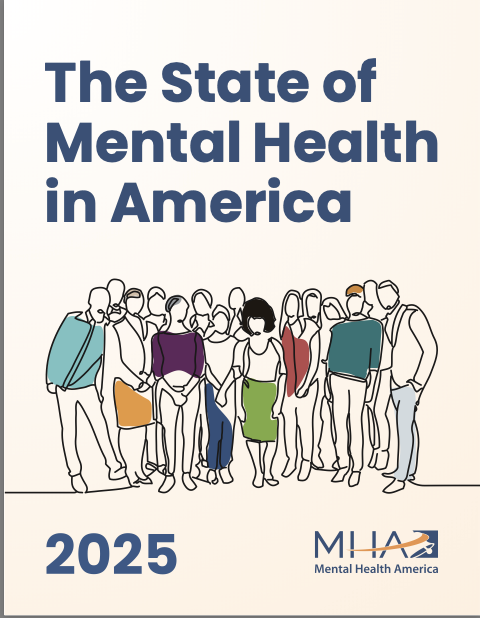Written by: Kiersten ‘KiKi’ Szymecki, MSW Policy Intern
Mental Health America (MHA) has shared its findings in the most recent iteration of its annual State of Mental Health in America Report. Data was collected from all 50 states and the District of Columbia, which utilized 17 different measures that were averaged to create overall rankings. Major changes from last year’s report are the addition of two measures: “Youth who have not had a preventive doctor’s visit in the past year” and “Adults with AMI who reported an unmet need for treatment.”
The intention of this report is to track changes in the prevalence of mental health conditions and access to care across the U.S., with data divided between adults and youth. States with better outcomes (lower prevalence and greater access) rank closer to 1, while states with poorer outcomes (higher prevalence and less access) rank closer to 51.
When viewing the data, which was mostly collected through 2023, it is notable that Virginia dropped from an overall ranking of 12th in 2024 to 22nd in 2025. New York, New Jersey, and Hawaii consistently scored the best across these 17 measures for health and wellness metrics, while Nevada and Arizona, for the 2nd year, are the lowest-ranked states.
According to the data in this report, findings indicate that mental health concerns have not changed significantly from 2021 to 2024. Unfortunately, in this context, stability does not indicate positive outcomes. Similar to last year’s report, 23.4% of adults in the U.S. experienced any mental illness (AMI), which is over 60 million people.
Across the United States, a common theme is that mental health needs, shared by all of us, often go unmet. In fact, 1 in 4 (25%) adults with AMI report seeking treatment without receiving adequate support.
Across states, recurring challenges include mental health workforce entry and retention barriers, challenges to healthcare access, socio-economic pressures, and persistent stigma. Virginia improved its scores and ranked comparatively better than other states in some areas, such as:
- 6th overall for prevalence of mental illness and access to care (adults 18+)
- Virginia ranked 9th in the prior year
- 20th for youth with a major depressive episode (MDE) who did not receive mental health services in the past year
- Virginia ranked 27th in the prior year meaning more youth received services in this data set
- 4th for adults with AMI whose private insurance does not cover treatment for mental or emotional problems
- Virginia ranked 8th in the prior year
Although there have been some improvements since last year’s report, the delivery, quality, and accessibility of mental health services in Virginia still require ongoing attention, particularly in the areas highlighted in the data below:
- 32nd overall for youth mental health care
- 17th in the prior year
- 34th overall for youth (12-17) in youth with at least one major depressive episode in the past year
- 26th in the prior year
- 37th in youth with serious thoughts of suicide
- 26th in the prior year
- 23rd in adults with AMI who are uninsured
- 13th in the prior year
- 37th in youth flourishing
- 31st in the prior year
- 37th in mental health workforce availability
- 38th in the prior year
The Commonwealth continues to advance initiatives aimed at improving mental health outcomes and enhancing the continuum of care across Virginia. It’s important to reiterate that this data is mainly collected from 2023, however when reviewing past reports from MHA, there are certain trends that remain consistent.
Key questions for further exploration:
- Youth Mental Health Outcomes
What underlying factors are driving Virginia’s lower rankings in youth mental health prevalence, access, and service availability, and how do these compare to trends in higher-performing states? - Workforce Pipeline and Retention
Despite ongoing workforce initiatives, why does Virginia continue to rank low in mental health workforce availability? What systemic or financial barriers are limiting entry, retention, or equitable distribution of providers across regions? - Access and Equity
Which populations, by region, income, or demographic group, are facing the most significant challenges in accessing timely and affordable mental health care, and what targeted interventions could reduce these disparities? - Funding and Sustainability
In light of reduced federal funding (e.g., Medicare and Medicaid cuts), what alternative or state-level strategies are being implemented to sustain and expand access to essential mental health services? - Community Empowerment
How can Virginia better empower local organizations, schools, and community coalitions to address youth mental health needs and implement early intervention and prevention programs? - Innovation and Service Models
What opportunities exist for expanding innovative care models, such as telehealth, school-based services, peer support services, or integrated behavioral health, to reach underserved communities in Virginia? - Accountability and Progress Tracking
What mechanisms are in place (or should be developed) to measure the effectiveness of current mental health policies, and how can progress be tracked transparently across different regions of the Commonwealth?
As the state’s oldest mental health non-profit, Mental Health Virginia’s long-standing mission to educate, empower, and advocate to improve the mental health of all Virginians deeply guides our vision that all people in our state achieve optimal mental wellness.
As we approach pre-filing for the upcoming General Assembly session, attention to legislation that further these initiatives will be monitored closely. Look out for future blog posts related to legislative highlights and exploration into some of the key questions mentioned above – we’re here to keep our community informed and serve as a trusted mental health resource.
Helpful Links:
MHA The State of Mental Health 2025 Report (This post is based on data from this report.)
MHA The State of Mental Health 2024 Report
Right Help, Right Now Year 2 Report
Inquiry? Comments? Email us at intern@mentalhealthvirginia.org




